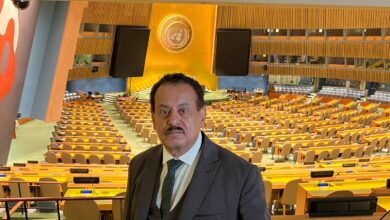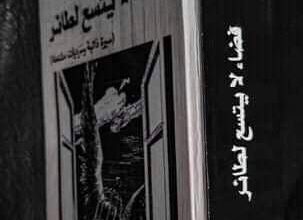The Prize

Yemeni mp
Ahmed Saif Hashed
In the same spirit, I approached excellence and its counterparts. I worked hard and persevered until I achieved first place in the paratrooper course. I was honored by Omar Al-Attas, then Vice Chairman of the General Staff. I received my award on graduation day, a wristwatch that felt like it pulsed with warmth and light in my heart. It expanded within me like a legend, culminating in the triumph of a hero deserving of this captivating prize, with its elegance, grace, and radiant beauty.
A flood of joy enveloped my surroundings; its brilliance captured my gaze, bright as the sun and beautiful as the moon. It was both fire and peace for a child who cherishes innocence. I rejoiced as children do; the joy of a child is unparalleled. That innocent child still resides within me, and I continuously strive to reclaim his memories, buried by time and forgotten. I attempt to extract myself from my heavy burdens and to wrest from my aged sorrow any glimpses of joy and happiness.
I recalled my elation upon securing first place in my military college class as I received the award. I remembered the joy of my childhood when my father gifted me a Swiss cross watch. That night, I could not sleep, overwhelmed by joy, feeling as if I and my watch were the center of this miraculous universe, brimming with wonders.
The value of awards to me lies in their significance, foremost of which is the merit of those who deserve them. As I received that watch, I felt as though the heavens themselves had humbled and bowed to me, graciously presenting me with the prize, enveloped in warmth and tenderness.
I heard the heavens say to me: “Reap the joy you seek; you truly deserve it and the award by right and merit. It befits you. You are the architect of your own stardom; no one else.” I felt as if I had plucked the Pleiades from the edges of the galaxy, carrying within my heart a bundle of joy nestled among my ribs. How beautiful it is to feel the sky bowing to you in humble reverence, allowing you to harvest bouquets of happiness while smiling upon you and blessing you with great victory.
* * *
Yet, even the Nobel Prize, the most renowned and prestigious award in the world, has sometimes gone to agents, occupiers, murderers, and war criminals—those who execute agendas and objectives for nations that support them through their international puppetry and political hegemony, in exchange for services rendered against their own countries, peoples, or even against others.
The trust in the credibility of the “Nobel” Peace Prize has become fragile and diminished. It continually fades, revealing scandals within its corridors that are sufficient to bury it in disgrace or to cover it with stones, or to heap dirt upon it in a deliberate effort to hide the stench that refuses to fade.
It is alarming to discover in its records and archives that “Hitler” was nominated for the prize just months before his invasion of Poland and the outbreak of a global war in which he was a principal actor. It is a disgrace to refer to “Hitler” as a prince of peace on earth, a gift from God for fighting for peace, and to consider his book “Mein Kampf” as the best and most important literary piece in the world. This deception, absurdity, hypocrisy, and falsehood are just part of what was included in a letter from “Erik Brandt,” the Swedish parliament member, to the committee responsible for awarding the Nobel Prizes.
* * *
How can we trust this prize and its credibility when we see German and French academics nominating the Italian dictator Mussolini—Hitler’s partner in World War II—for the Nobel Peace Prize? And when was this? Just one month before Italy’s invasion of Ethiopia.
This “Nobel Peace Prize” was nominated to Joseph Stalin twice after World War II. How terrifying is such a nomination! No less frightening is the fact that it was awarded to Mikhail Gorbachev, the president of the Soviet Union who dismantled it, causing the collapse of a superpower that spanned a sixth of the world in favor of its arch-enemy, the United States. Gorbachev was supported by a vast and powerful media machine, coupled with widespread deception that was as expansive as the sky itself, leading to utter devastation.
How can we celebrate the Nobel Peace Prize, and how can we trust its committee that chooses who receives it, when we know for certain that a significant number of its laureates are murderers, war criminals, and notorious slaughterers?
Menachem Begin, the founder and leader of the Irgun organization, committed the Deir Yassin massacre in 1948, resulting in the death of 360 people. Yet, he was awarded the Nobel Peace Prize in 1978, just a year after he became Prime Minister of Israel, only to perpetrate an even greater and more horrific massacre against Palestinian refugees in Beirut in 1982, known as the Sabra and Shatila massacre, where nearly two thousand Palestinians lost their lives, most of them women, children, and the elderly.
It is shocking and inconceivable—a catastrophic disparity between reality and what is claimed. An outrageous absurdity without restraint. The world-renowned writer and novelist Gabriel García Márquez, who won the Nobel Prize in Literature, expressed his astonishment by saying: “It is unbelievable… Forgive me for saying that I am ashamed to be associated with this prize. It is truly one of the wonders of the world that someone like Menachem Begin, the Israeli Prime Minister, is honored for his criminal policies. Begin’s receipt of the Nobel Peace Prize remains one of the wonders of the world, and it does not lessen my astonishment to say that the world is full of absurdities and that there are stranger things.”
In 1994, Israeli Prime Minister Shimon Peres was awarded the Nobel Peace Prize, despite a history marked by massacres, settlement expansion, and the forced displacement of Palestinians. This prompted the Dutch writer Richard Van to declare, “It is a disgrace for the Nobel Foundation to keep such names on the list of laureates.”
Sometimes, when reviewing the names of Nobel Prize nominees and recipients, one might feel as if they are witnessing a bewildering race of absurdities, a competition of astonishment under the banner of “Believe it or not.” Perhaps this is why the list of nominees remains secret for a long time; what is hidden is often more significant.
The Nobel Prize, particularly the one awarded for peace, seems to deviate from the true concepts we understand and experience in reality. Worse still is the overwhelming deception that accompanies it, which at the very least distorts consciousness and twists the truth, ultimately harming not only the prize itself but also genuine peace efforts. It is a grave misfortune for the Nobel Peace Prize to be awarded to murderers, slaughters, and war criminals.
The concept of peace, according to the Nobel Committee that selects its laureates, contrasts starkly with the peace we comprehend and witness. The difference is vast and alarming. It is a distorted notion, completely inverted in one aspect, and dictated in another by the interests and prevailing perceptions of the global capitalist system and its understanding of peace.
This concept is somewhat akin to the notion of peace found in George Orwell’s novel 1984; “War is peace,” where the Ministry of Peace is concerned with warfare, while the Ministry of Truth is responsible for media manipulation and consciousness distortion. It resembles the massive media deception surrounding the Nobel Prize, steeped in falsehood.
* * *
What has happened is astonishing and strange—paradoxes that provoke wonder and questions. A pile of astonishment and oddities accumulates. How could the Nobel Peace Committee ignore and even prevent the award from going to a remarkable and great figure in the fight against poverty, a true hero of peace and tolerance like Mahatma Gandhi? How could it deny him this honor? It is unbelievable!
Even more strange and shocking is that he was excluded from receiving it twelve times, the last being just days before his assassination in 1948! Meanwhile, it is easily and gracefully awarded to war criminals and murderers who have no connection to peace whatsoever. These shocking paradoxes strip the prize of its meaning, reveal those behind it, and reach a level of certainty that collapses every claim.
How can the Nobel Peace Prize be awarded to U.S. Secretary of State Henry Kissinger in 1973, when he was one of the architects of American policy during the Vietnam War? This catastrophic war was marked by a scorched-earth policy, in which the United States committed horrific war crimes and even more terrifying crimes against humanity.
Henry Kissinger, the Secretary of State of a United States administration that supported and facilitated the military coup led by the bloodthirsty dictator Augusto Pinochet in Chile, which overthrew the democratically elected president Salvador Allende—the first democratically elected leader in Latin America—should not be considered deserving of a Peace Prize.
We do not speak lightly. This coup was orchestrated and executed by the CIA, with the backing and support of the U.S. administration, as revealed by documents declassified after 25 years, which confirmed the CIA’s involvement in planning, executing, and financing the coup. The consequences of this coup, along with the subsequent killings and repression of the Chilean people, were catastrophic.
I recall watching clips from a documentary film at an early age, which showed scenes from the coup, highlighting the bravery and composure of the great man Salvador Allende in what were perhaps the final hours or minutes of his life, facing the coup and ultimately becoming a martyr. His legacy still resides in my heart and memory, and I remain deeply moved by his courage and greatness to this day.
* * *
The controversies surrounding the Nobel Prize prompted American writer and novelist Irving Wallace to compose a massive and provocative novel titled “The Prize,” in which he unveiled the secrets and intricacies surrounding it. He concluded that bribery, sexual scandals, political espionage, economic interests, and moral corruption were the forces controlling the prize, ultimately declaring it a global scandal.
Colombian novelist Gabriel García Márquez, a Nobel laureate himself, highlighted many of the flaws inherent in the award’s merits, describing the committee members as “those elderly men who make decisions are like a gang plotting in the pitch dark.” Márquez refused to accept the award in protest against the Nobel Prize being awarded to terrorists and war criminals such as Begin, Rabin, and Shamir, who are falsely marketed as advocates of global peace. It is said that Márquez later accepted the prize, possibly out of necessity or compulsion.
Critics have questioned how a global literary giant like Tolstoy could be excluded from the Nobel Prize in Literature, while it was awarded to British Prime Minister Winston Churchill for his political speeches and historical writings. These are two entirely different realms, with a vast chasm separating politics from literature. In this regard, the writer and storyteller Azmi Abdul Wahab notes in his book “The Nobel Prize – A Crisis of Trust” that Churchill was never once caught engaging in literary writing.
The author also recounts other incidents that expose the prize’s historical neglect of great thinkers and creators, such as the founder of psychology, Sigmund Freud, who remained on the prize list for twelve years, only to have the committee write on his evaluation form, “No need for further investigation into Freud as his works have not provided any scientific benefit.” The committee also overlooked other deserving figures like Tolstoy, Henrik Ibsen, Émile Zola, and Mark Twain.
Writer Mahmoud Abbas Al-Aqqad criticized the Nobel Prize for Literature and its committee, questioning its credibility in his book “Global Literary Prizes” through research and comparisons between ten winners and ten non-winners, concluding that those who did not receive the prize were far superior to the laureates.
* * *
Others have criticized the deviations in awarding the Nobel Peace Prize, citing Barack Obama’s receipt of the prize in 2009, just nine months into his presidency, with his nomination occurring only twelve days after he took office. In both cases, he did not achieve anything significant for peace during his term—if anything, the opposite occurred.
One critic remarked on Obama’s unworthiness for the prize, stating: “He was awarded the prize not for a peace he created, but for a peace ‘he might create,’ which contradicts Nobel’s own will.” A critic bitterly concluded that if Nobel were to rise from his grave and witness how his prize is treated, he would likely prefer to return to his resting place rather than participate in its presentation.
Norwegian lawyer Fredrik Havremil accused the Nobel Peace Committee of politicizing the award when it was granted to President Obama, believing that the prize loses its value and transparency through politicization and the seepage of corruption. The American newspaper “The Financial Times” asserted that awarding the Nobel Peace Prize to Obama was an insult to him, to the prize itself, and to the concept of peace.
* * *
The head of the Nobel Committee and one of its most prominent Swedish members in the past century, Sel Asbrink, stated in his book “The Prize” that the committee receives political directives from outside parties and treats many entities with bias. He admitted that the committee made decisions based on political backgrounds, citing the exclusion of Tolstoy from the Nobel Prize in Literature despite his literary significance, while awarding it to the British politician and former Prime Minister.
Asbrink revealed aspects of the politicization of the prize, its lack of independence, and the dishonesty of those in charge, referencing declassified documents of confidential consultations among committee members. He pointed out several examples, including the awarding of the prize to Mohamed Al Baradei, the former director of the International Atomic Energy Agency, which was granted at the behest of the U.S. as a reward for his role in weakening and destroying Iraq and pressuring Iran.
Dr. Yousri Abu Shadi, the chief inspector of the International Atomic Energy Agency, stated in this regard: “We said in the final report that Iraq is free of nuclear weapons and does not have the capability to manufacture them. We recommended that Iraq be removed from under Chapter VII regarding sanctions,” emphasizing that ” Al Baradei ” was the reason for the alteration of the report before it was submitted to the Security Council.
Abu Shadi added that awarding Al Baradei the Nobel Peace Prize was recognition of his efforts to contain the proliferation of nuclear weapons, while the true intent was to reward him for his role in the blockade and destruction of Iraq. Al Baradei had quickly ascended through the ranks of the agency, serving three consecutive terms as its head, and provided cover for the invasion of Iraq in 2003.
American academic “Bruton Feldman” argues in his critical book “The Nobel Prize: A History of Genius, Controversy, and Favor” that the Nobel Peace Prize is increasingly viewed as a political award. He contends that the committee members who choose the Nobel Prize in Literature show bias against authors with political views differing from their own.
Norwegian lawyer Frederick Havremil, a legal expert on the Nobel Prize, accused the chair of the Nobel Peace Committee of politicizing the award, questioning: “How can we be convinced that the award is free from politicization when its members are known to have political affiliations?” Furthermore, committee members have been accused of aligning themselves with the United States and the West for the sake of gaining more international positions and benefits.
French writer “Marc Holter” claims that 70% of Nobel Prize awards are based on political considerations. Meanwhile, American journalist and Nobel specialist “Scott London” states that “winners are chosen not based on their merit but rather on the advertising value attributed to them.” Lebanese political researcher and writer Saadallah Mazrani asserts that the Nobel Peace Prize is a political award subject to the standards, concepts, and values of European politics.
Others have gone so far as to suggest that the Nobel Peace Prize is an American Western award aimed at purely political objectives, bearing no relation to the pursuit of peace.
* * *






